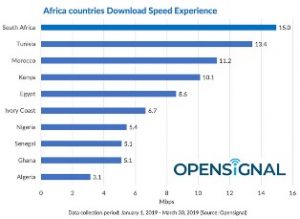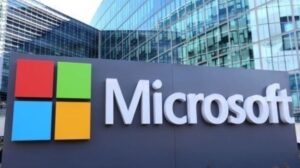Telecom
Nigeria Lags in 4G Availability Report of Africa
Nigeria seats at eighth position out of 10 top African countries with 4G availability according to mobile analytics company Opensignal in its State of Mobile Network Experience report which was published last month.
Opensignal’s 4G availability analysis shows Kenya, Morocco and South Africa featured in the top four – but the winner was something of a revelation, the firm says.
Senegal topped the Africa table with a score of 77.2% – beating some much more advanced markets in the global rankings.
According to Opensignal, Senegal can be proud of a relatively advanced 4G mobile network experience, as Orange has already launched LTE-A in the country, while Tigo’s 4G network rollout is well under way.
“Much like in our download speed analysis, only one African country saw its 4G availability fall over the past year, as Ghana saw its score drop nearly five percentage points to 61.2%,” Boyland notes.
“Our users in Senegal saw a big improvement in their chart-topping 4G availability score, which increased over 15 points to reach 77.2%, but Egypt saw the greatest improvement of over 17 points in the past year to top 65%, while Algeria and Nigeria also saw their scores grow by over 10 points.”
Mobile-first markets

However, when measuring how the mobile-first markets in Africa stack up against each other, Opensignal compared 10 countries from the continent: SA, Tunisia, Morocco, Kenya, Ivory Coast, Egypt, Algeria, Ghana, Senegal and Nigeria.
“South Africa topped our Africa Download Speed Experience chart with a fairly impressive score of 15Mbps, while Tunisia, Morocco and Kenya managed average speeds of over 10Mbps,” says Peter Boyland, senior analyst at Opensignal.
Earlier this year, the mobile analytics company noted SA is one of the world’s most consistent countries when comparing the difference between the slowest and fastest 4G download speeds that mobile users experience throughout the day.
In the latest study, the firm, nonetheless, says SA’s score was quite a way behind the leading global scores, but the country still just managed to sneak into the top half of the global rankings.
The firm explains that almost all the African countries it analysed saw their download speed experience scores increase over the past year, with only Algeria (3.1Mbps) seeing its average speed dip slightly.
It adds that between the first three months of 2018 and the same period of 2019, Tunisia saw the biggest increase in terms of Mbps, as its score grew 3.6Mbps to reach an average of 13.4Mbps.
“But our users in Senegal experienced the greatest download speed experience boost by percentage, as the average speed in the country jumped close to 50%,” Boyland says.
Good video
Opensignal points out that SA also topped the video experience table, as one of two African nations which scored a “good” rating (55-65 out of 100) in this metric.
It explains that a good video experience is characterised by video streamed from the Internet to a phone or tablet rendering at both low and high resolutions, but exhibiting some loading time before playback begins and some stalling, especially at higher resolutions.
Tunisia also managed a good rating, while three African countries – Egypt, Morocco and Kenya – scored in the “fair” range (40-55).
“Our users in these countries should expect longer loading times and frequent stalling at higher resolutions, but a better video experience at low resolutions,” Boyland says.
Half of the African countries Opensignal analysed rated as “poor” for video experience (0-40), characterised by frequent stalling during video playback and long loading times, even at low resolutions.
Since 4G is still in its infancy in many African markets, the firm says a large proportion of the continent’s mobile networks are not yet suited to delivering a good mobile video experience.
But, nonetheless, it says mobile coverage, and particularly data connectivity, are transforming the lives of billions of people on the continent.
“The majority of Africans have never experienced fixed-line broadband, meaning mobile is opening up services such as mobile banking and payments, social media and even instant messaging that many of us have taken for granted for decades. And as 4G connectivity improves and 5G comes to the continent, more and more people will see their lives transformed by their mobile network experience,” Boyland concludes.
Telecom
Nigeria Has World’s Most Affordable Data Costs – GSMA
Nigeria has an average data cost of $0.38 per gigabyte, making her the most affordable countries globally and one of the cheapest in Africa for mobile data services.

United States averages $6 per gigabyte and South Africa with $1.77 per gigabyte rank the highest globally and in Africa respectively.
According to the GSMA, Nigerian data costs, as a percentage of Gross National Income (GNI) per capita, are among the lowest across Africa.
The reports by the body lends weight to telecom operators advocacy for tariff adjustments to address economic pressures threatening the sector’s sustainability.
The GSMA report, titled “The Role of Mobile Technology in Driving the Digital Economy in Nigeria,” highlighted Nigeria’s competitive data pricing, which is significantly lower than other African nations, such as Kenya ($0.59 per gigabyte), Ethiopia ($0.68 per gigabyte), and South Africa ($1.77 per gigabyte).
By contrast, the United States averages $6 per gigabyte, underscoring Nigeria’s advantage in offering cost-effective connectivity.
The cost of mobile data in Africa varies greatly by country and region.
Data costs can refer to the cost of mobile data or the cost of acquiring, maintaining, and using business data.
In 2023, the average cost of 1 GB of mobile data in Sub-Saharan Africa was $3.31, while in Northern Africa it was $0.86.
Telecommunications operators in Nigeria have been requesting some policy changes as well as tariff rebalancing to enable them deliver support to the Government’s digital economy objectives.
They have called for the simplification and improvement of the Right of Way (RoW) charging and administration process, harmonised across the country
According to them, all government authorities (at national and sub-national levels) should apply the national maximum RoW fee of N145 per/LSQM adopted by the National Economic Council (NEC) for the deployment of fibre across all states in Nigeria.
There should be a single point of contact in each state for the RoW application process while the duration for the approval process should be digitalised and limited to a maximum of one month.
Simplification and reduction of the tax burden on the mobile sector
On tariff, recall that the Association of Licensed Telecommunications Operators of Nigeria (ALTON) and the Association of Telecommunications Companies of Nigeria (ATCON) had urged the Nigerian Communications Commission (NCC) to consider reviewing tariffs upward to address rising operational costs.
Nodding in agreement, Bismarck Rewane, chief executive officer, Financial Derivatives, said the proposed tariff hike by telecommunications will help reduce inflation in the country.
He said it would help to reduce inflation because it increases productivity, stressing that the price of MTN shares went up by 10% to 220.
Rewane reiterated that investors had already factored that in, adding that they are expecting a lot of good goodies.
“But more important to think about is the fact that because of an increase in tariff and an increase in investment to make the industry sustainable, they’re going to see an increase in productivity, not directly but indirectly.
“Any increase in productivity and output is likely to allow inflation to moderate, which is the goal. So, we heard from the policymaker, Bosun Tijani, who was very clear that we want a sustainable sector. But we also heard from the regulator saying that we will hold these guys to quality of service.
“We also heard from the operators, MTN that they are all revving up. So in all, there are economic benefits because of increased output and productivity. Two, policymakers are aligned because they want this to lead to a moderation in inflation,” he added.
He further said that it was not a bad deal and re-echoed the minister’s comment that the tariff hike will not be 100 per cent.
“Will they get 100%? No, they will definitely not. We suspect that we are going to likely see something between 40 and 50% which is fair after so many years of static changes,” Rewane added.
Telecom
Bismarck, Economist Claims Planned Tariff Hike by Telcos Will Reduce Inflation
Bismarck Rewane, chief executive officer, Financial Derivatives, has said the proposed tariff hike by telecommunications will help reduce inflation in the country.

Rewane made this statement on Channels Television’s Business Morning on Thursday.
Recall that Association of Licensed Telecommunications Operators of Nigeria (ALTON) and the Association of Telecommunications Companies of Nigeria (ATCON) had urged the Nigerian Communications Commission (NCC) to consider reviewing tariffs upward to address rising operational costs.
On January 3, Karl Toriola, chief executive officer (CEO), MTN Nigeria, said telcos want a 100 percent tariff hike.
According to Rewane, who previously supported the plans for a tariff hike, the move will make the sector more sustainable.
He said it would help to reduce inflation because it increases productivity, stressing that the price of MTN shares went up by 10% to 220.
Rewane reiterated that investors had already factored that in, adding that they are expecting a lot of good goodies.
“But more important to think about is the fact that because of an increase in tariff and an increase in investment to make the industry sustainable, they’re going to see an increase in productivity, not directly but indirectly.
“Any increase in productivity and output is likely to allow inflation to moderate, which is the goal. So, we heard from the policymaker Bosun Tijani, who was very clear that we want a sustainable sector. But we also heard from the regulator saying that we will hold these guys to quality of service.
“We also heard from the operators, MTN that they are all revving up. So in all, there are economic benefits because of increased output and productivity. Two, policymakers are aligned because they want this to lead to a moderation in inflation,” he added.
He further said that it was not a bad deal and re-echoed the minister’s comment that the tariff hike will not be 100 per cent.
“Will they get 100%? No, they will definitely not. We suspect that we are going to likely see something between 40 and 50% which is fair after so many years of static changes,” Rewane added.
Telecom
Microsoft to Spend $80Bn on AI Data Centres
In a bid to build AI-enabled data centres, Brad Smith, vice chair and president, Microsoft has disclosed the company’s plan to spend approximately $80 billion in its current financial year (to end in June), with more than half of that investment designated for the US.

Smith in a blog post, explained the tech giant plans to use the data centres “to train AI models and deploy AI and cloud-based applications around the world.”
Smith welcomed U.S. President Donald Trump to his second term in office, he cautioned against “heavy-handed regulations” that could slow down the private sector.
“The most important US public-policy priority should be to ensure that the US private sector can continue to advance with the wind at its back,” Smith stated.
He further explained that the U.S. “needs a pragmatic export control policy that balances strong security protection for AI components in trusted data centers with the ability for U.S. companies to expand rapidly and provide a reliable source of supply to the many countries that are American allies and friends.”
Stating that the US is well-positioned to flourish in its development of AI due to solid technology development and an innovative private sector.
“If the Trump Administration can develop a strong national AI talent strategy and use AI to make the government more effective and efficient, it will put the country on a promising path.”
He stated the U.S. is in a strong position to “win the essential race with China by advancing international adoption of American AI.”
Smith further claimed U.S. “products are more trusted than their Chinese counterparts, and our private sector is unmatched in its ability to invest in infrastructure around the world.”

 E-Financial2 days ago
E-Financial2 days agoSEC to Strengthen Borrowing Framework for Governments, Corporates

 E-Business2 days ago
E-Business2 days agoKaspersky Reviews Main Business Headache Related to IT Security

 E-Business3 days ago
E-Business3 days agoFirm Explores 2025 Potential IT Outage and Supply Chain Risk Scenarios

 Telecom2 days ago
Telecom2 days agoBismarck, Economist Claims Planned Tariff Hike by Telcos Will Reduce Inflation

 E-Financial3 days ago
E-Financial3 days agoGTCO Completes First Phase of Capital Raise Initiative with N209bn

 Telecom3 days ago
Telecom3 days agoCall, Data Tariffs Will Increase – Nigerian Minister, Tijani Declares

 E-Business2 days ago
E-Business2 days agoFG to Add Iris Biometrics to Digital ID for more Inclusion

 Telecom3 days ago
Telecom3 days agoTD Africa Empowers Nigerians with Sustainable Energy Solutions
















